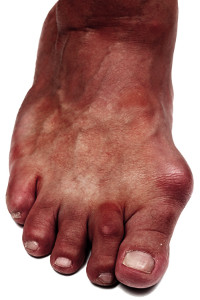 A bunion is typically found at the bottom of the big toe. It is comprised of a growth that appears to be of a bony texture, and severe pain is often experienced. The causes for this ailment developing may originate from a predisposed inherited gene or from an injury the foot has endured. There are several ways to determine if you have this condition, which may be noticing reddened skin, a tingling sensation, or swelling in the affected area. Treatment typically involves specific surgery that can be performed to remove the bunion or choosing a more conservative method where partial relief may be obtained. Recent research has shown that wearing shoes with a bigger toe area is helpful in accommodating the bunion, in addition to pads that are placed on the bunion which may help in relieving pressure. Seeking a consultation with a podiatrist is highly recommended if you are experiencing pain or discomfort.
A bunion is typically found at the bottom of the big toe. It is comprised of a growth that appears to be of a bony texture, and severe pain is often experienced. The causes for this ailment developing may originate from a predisposed inherited gene or from an injury the foot has endured. There are several ways to determine if you have this condition, which may be noticing reddened skin, a tingling sensation, or swelling in the affected area. Treatment typically involves specific surgery that can be performed to remove the bunion or choosing a more conservative method where partial relief may be obtained. Recent research has shown that wearing shoes with a bigger toe area is helpful in accommodating the bunion, in addition to pads that are placed on the bunion which may help in relieving pressure. Seeking a consultation with a podiatrist is highly recommended if you are experiencing pain or discomfort.
If you are suffering from bunion pain, contact one of our podiatrists of Sutera and Jones Surgical Podiatry. Our doctors can provide the care you need to keep you pain-free and on your feet.
What Is a Bunion?
Bunions are painful bony bumps that usually develop on the inside of the foot at the joint of the big toe. As the deformity increases over time, it may become painful to walk and wear shoes. Women are more likely to exacerbate existing bunions since they often wear tight, narrow shoes that shift their toes together. Bunion pain can be relieved by wearing wider shoes with enough room for the toes.
Causes
- Genetics – some people inherit feet that are more prone to bunion development
- Inflammatory Conditions - rheumatoid arthritis and polio may cause bunion development
Symptoms
- Redness and inflammation
- Pain and tenderness
- Callus or corns on the bump
- Restricted motion in the big toe
In order to diagnose your bunion, your podiatrist may ask about your medical history, symptoms, and general health. Your doctor might also order an x-ray to take a closer look at your feet. Nonsurgical treatment options include orthotics, padding, icing, changes in footwear, and medication. If nonsurgical treatments don’t alleviate your bunion pain, surgery may be necessary.
If you have any questions, please feel free to contact one of our offices located in Media, Glen Mills, Riddle Memorial Hospital, and Concordville, PA . We offer the newest diagnostic and treatment technologies for all your foot care needs.
